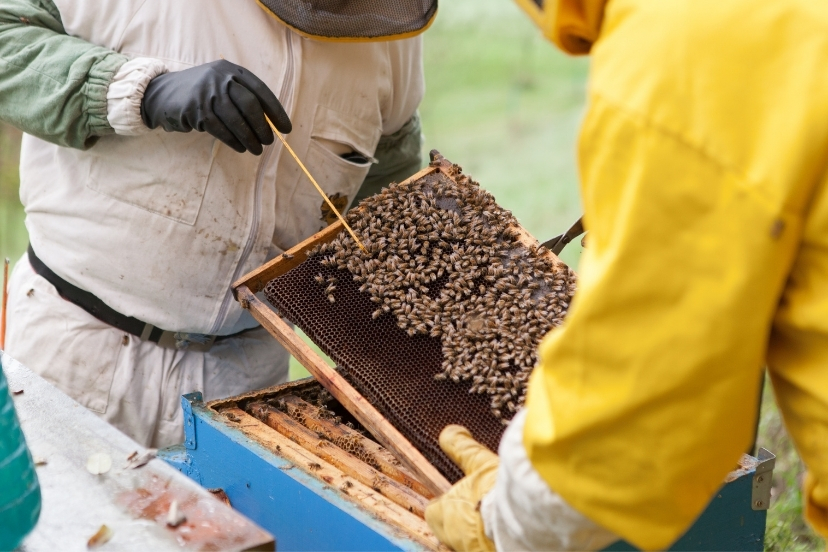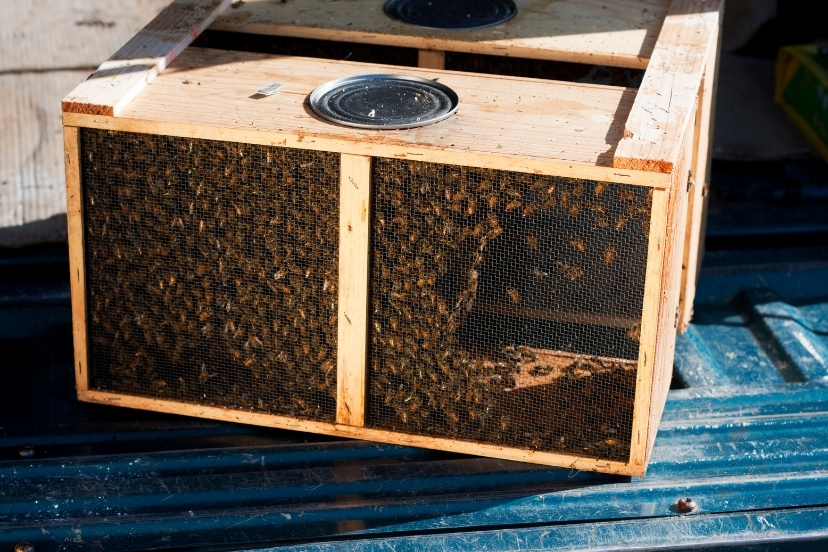Interested in getting started in backyard beekeeping?
If so, you’ll be joining a very large group of hobbyist beekeepers. There likely are millions of beekeepers worldwide that keep just a hive or two in their yards.
It’s how many people get their start in beekeeping. It’s how I got my start in beekeeping. (Just be careful not to let your hobby outgrow your yard, like I did!)
Keeping bees in an urban or suburban environment is very doable. But you do need to set-up and manage your bees properly to avoid problems.
Here are a few tips for making backyard beekeeping enjoyable for you, and a non-issue for your neighbors:
Supply Water For Your Bees
Honey bees need a good supply of water. If you don’t supply a source of water, they’ll find it somewhere.
I learned this lesson not long after I started keeping bees.
When I was a youngster, and was bitten by the beekeeping bug, I started out with just one hive in our backyard.
But that one hive soon had lots of company.
I couldn’t turn down a free swarm, and every time one of my own hives swarmed, or someone called with a swarm they wanted removed, I ended up with another hive.
After a couple of years of backyard beekeeping, I had nearly twenty hives in our backyard (which made mowing the yard quite the adventure!).
One day the neighbor lady knocked on the door and nicely asked if we couldn’t train our bees to stay out of her yard. It seems my bees had decided that her dogs’ water bowls were an excellent source of water, and had turned her yard into the local honey bee watering hole.
My parents were rather embarrassed. And though they had been very patient with my new hobby, they told me it was time to find a new home for the bees. So I found a nice farmer on the outskirts of town who let me move most of my hives onto his land.
And I made sure to supply a source of water for the one or two hives left in our yard.
So if you’re going into backyard beekeeping, be sure to supply your bees with water. Just a bowl or bucket with fresh water will do the trick, but be sure to put some wood chips (or some other floating objects) in the container, otherwise many bees will drown trying to get the water.
Something like a small pond or water garden with floating plants can also serve nicely as a source of water for the bees.
Control the Flight Path of the Bees As Needed
It’s best if you can ensure that your bees will not tangle with neighbors or pedestrians while flying to or from the hive.
If you already have a solid fence around your backyard that’s at least six feet in height, then you’re set. The fence will force the bees to fly above anyone that might be close to your yard, preventing inadvertent collisions.
If you don’t have a suitable fence, then you might consider putting one up before you get your bees.
Of course, any obstacle that will cause the bees to fly up before they fly out will do the job; it doesn’t have to be a fence. Tall shrubs will also do the job nicely.
But there’s one particular advantage about having a solid fence: if your neighbors can’t see into your yard, they may never even know about your backyard beekeeping.
And though the old saying “what you don’t know won’t hurt you” is quite often wrong, in this case it would be correct. It won’t hurt your neighbors at all NOT to know about your bees!
There are people that are simply afraid of bees beyond all reason. If someone like this happens to be among your neighbors, it would be just as well if they never know that you have bees in your yard.
Control Swarming to the Best of Your Ability
Perhaps nothing will disturb a nervous neighbor more than having a great cloud of bees descend upon their property. Swarms are harmless, but regardless, you’ll want to do all that you can to prevent your hives from swarming.
Experienced beekeepers know that this is more easily said than done, but there are steps you can take to greatly reduce the likelihood of your bees swarming.
You might also consider keeping a bait hive in your yard.
A bait hive is simply a structure of some sort that might be attractive to a swarm. An old hive body that has been occupied by bees in the past can make an excellent bait hive. You can even buy a pheromone attractant to apply to the bait hive to make it more appealing to the bees.
With a bait hive in your yard, there’s a decent chance that if your bees swarm in spite of your best efforts, the swarm will occupy the bait hive instead of invading a neighbor’s yard.
Of course, with a bait hive you could also end up with a swarm from a hive other than your own – something that you may or may not desire.
Be Aware of City Ordinances BEFORE You Start Beekeeping
Just as with urban beekeeping, potential backyard beekeepers need to be aware of any legal ramifications of keeping bees in their city. Though absolute bans on beekeeping within a municipality are rare, they do unfortunately exist.
More commonly, beekeepers may have to register their hives, and in some cases, pay a small permit fee.
So before becoming involved with backyard beekeeping, be sure to familiarize yourself with any beekeeping regulations that may exist in your area.
A Little Bit of Honey, and a Little Bit of Education…
Can both go a long way toward maintaining goodwill with your immediate neighbors.
If you’re careful and prudent, your backyard beekeeping operation shouldn’t pose any problems at all for your next-door neighbors. But some folks might be a bit spooked just by the thought of having bees so close.
An occasional gift of a jar of honey will certainly do no harm to neighborly relations. Also, be able and willing to calm their concerns by correcting some of the misconceptions they may have about honey bees.
YOU know that your bees are not vicious killers, just waiting for the opportunity to descend en masse upon some innocent soul and sting them to death. But sadly – thanks in no small part to the silly movies and sensationalized news stories they’ve been exposed to – your neighbors may think that is EXACTLY the risk your bees pose.
If so, you’ll have the opportunity and the obligation to dispel those fears, and educate them about the crucial role honey bees play in the production of food.
One Last Tip:
As with most situations in life, a little applied common sense will make backyard beekeeping go much smoother.
For example, don’t work your bees under conditions that you know are less than ideal. And if you end up with a hive that turns out to be somewhat aggressive by nature, requeen it with a queen known to be of good, gentle stock.
After all, anything that minimizes the chance of your hobby disturbing your neighbor will also make beekeeping more pleasant for you.


